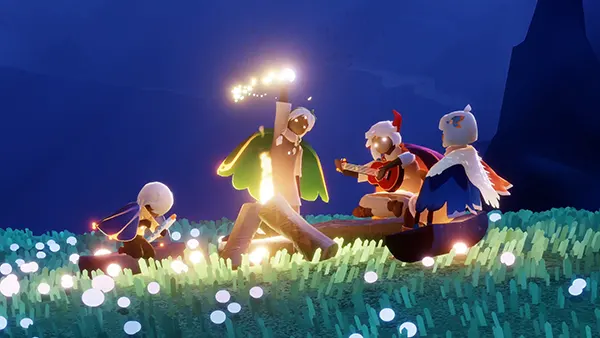
Sky: Children of the Light — a Journey Through Friendship and Exploration
Sky: Children of the Light is not just another artistic platformer—it’s a heartfelt expression of shared discovery and human connection. Created by the visionary team behind Journey, this title continues to evolve and captivate audiences across platforms. As of February 2025, it remains a standout title that combines immersive design with meaningful social interaction. In this detailed review, we explore what makes Sky such a rare and enduring experience in today’s gaming world.
The Artistic Vision Behind Sky: Children of the Light
Sky: Children of the Light, developed by thatgamecompany, has stood out in the indie gaming scene since its global release in July 2019. As of February 2025, it remains one of the most beloved free-to-play artistic platformers available on iOS, Android, Nintendo Switch, and PlayStation. Its delicate, dreamlike visuals and emotionally driven storytelling set it apart from traditional platformers.
The game introduces players to the Kingdom of Sky, a beautifully animated universe comprising seven realms inspired by stages of life. Each realm brings a unique atmosphere, colour palette, and musical theme that enhances the emotional weight of the player’s journey. From golden deserts to stormy wastelands, Sky uses art and sound to immerse players in a living, breathing world.
Thatgamecompany’s approach to visual storytelling invites introspection and encourages emotional responses. The minimalist interface, gentle lighting, and fluid animations are not just aesthetic choices—they actively support the game’s central themes of connection, discovery, and empathy. Sky remains one of the few games where artistic integrity and user experience are inseparably entwined.
Unique Mechanics and World Design
Unlike conventional platformers, Sky replaces combat and competition with cooperation and exploration. Players control “Children of the Light”, celestial beings who collect light to restore fallen stars. Gliding through open skies and solving environmental puzzles, players interact through emotes and shared tasks, fostering spontaneous collaboration rather than rivalry.
The open-world format encourages free exploration, allowing players to wander without pressure. Flight, one of the game’s core mechanics, is powered by the collection of light and shaped by weather, terrain, and altitude. This not only adds a sense of realism but also enhances the emotional reward of soaring through the skies alongside others.
Real-time weather changes, shifting seasons, and live events add freshness to gameplay. As of early 2025, the game continues to update regularly, with special events like Days of Bloom and the Season of Revival bringing new quests, cosmetics, and stories that blend seamlessly into the overarching narrative.
Social Interaction and the Power of Connection
One of the most defining features of Sky is its emphasis on social connection. The game does not use voice chat or text for communication. Instead, it relies on gestures, shared actions, and candlelight exchanges to build friendships. This system is not only safer for younger audiences but also enhances the sense of purity and trust between players.
Players can unlock new interactions—such as holding hands, hugging, or playing instruments—through the use of in-game currency (candles, hearts, and ascended candles). These mechanics support the idea that building relationships takes time and mutual effort. Friendship trees allow players to gradually develop bonds and share progress.
Sky’s non-verbal social system has earned praise for enabling sincere and heartfelt exchanges. During community events or regular gameplay, spontaneous collaborations often form naturally, reminding players of the joy in shared experiences. These connections often extend beyond the game, with many players forming friendships that last years.
Multiplayer without Toxicity
In contrast to many multiplayer games, Sky fosters a supportive and non-competitive atmosphere. There are no leaderboards, rankings, or aggressive mechanics. This deliberate absence of competition allows players to focus on cooperation, storytelling, and exploration without fear of judgment or harassment.
Moderation tools are built into the game to ensure safety. Players can report misconduct, block interactions, or simply choose to ignore others. As of 2025, these tools have proven effective, contributing to Sky’s reputation as a safe online environment for all ages.
The developers continuously engage with the community, often adjusting game mechanics based on player feedback. This open communication further strengthens the sense of belonging and shared ownership among users. For many, Sky is more than just a game—it’s a peaceful sanctuary in the digital world.

Live Seasons and a Constantly Evolving World
Sky’s seasonal content system ensures that the game remains dynamic and engaging. Every few months, a new season introduces themed realms, characters, and story arcs. These seasons are not just decorative—they add lore, gameplay features, and emotional depth that resonate with the game’s core themes of growth and compassion.
For example, the “Season of Passage” explored rites of adolescence, while the “Season of Remembrance” paid tribute to those who have passed on. These stories are accessible to all players and require collaboration to complete, reinforcing the game’s central values. In February 2025, the ongoing “Season of Revival” focuses on healing and rebuilding.
Players earn seasonal currency by helping spirits and completing daily tasks. These can be exchanged for unique cosmetics and interactions, adding customisation and reward without relying on pay-to-win models. Premium adventure passes are optional and enhance the experience but are never mandatory for progression.
Accessibility and Platform Expansion
Sky continues to prioritise accessibility. The game offers adjustable controls, colour-blind modes, and cross-platform functionality across mobile, console, and cloud services. Players can connect across devices with a single account, making it easier than ever to experience the game anywhere.
Thatgamecompany’s plans for 2025 include expansion into PC platforms and wider localisation for non-English-speaking markets. This aligns with the game’s philosophy of inclusivity and universal storytelling. The aim is to remove technical and linguistic barriers to ensure more people can join and connect.
Sky’s growth and enduring popularity illustrate that video games can be more than just entertainment—they can be platforms for emotional connection, storytelling, and meaningful human interaction. As of now, it stands as a shining example of what modern game design can aspire to.
